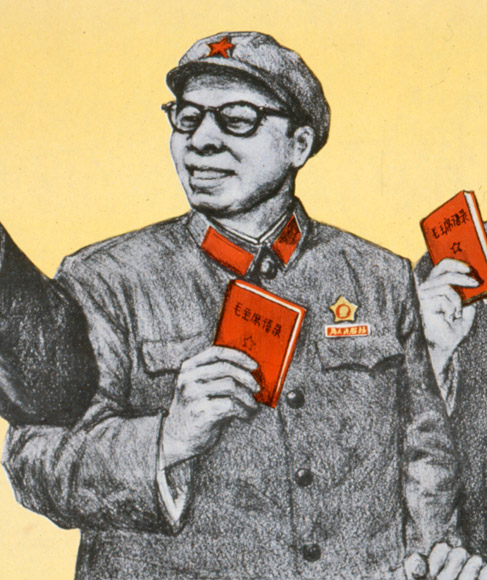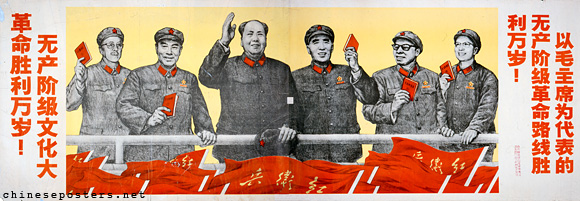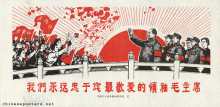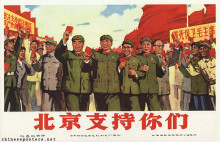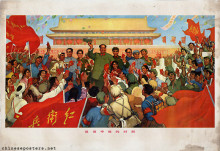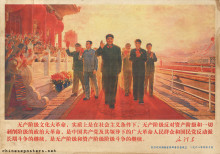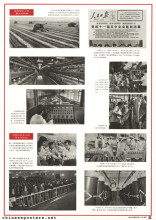Detail from poster ‘Long live the victory of the proletarian revolutionary line...’, 1967
Chen Boda (陈伯达, 1904-1989) was born in a poor peasant family in Hui’an, Fujian Province. At an early age, he became politically active. He joined the Chinese Communist Party in 1924. From 1927-1930 he studied at the Sun Yatsen University in Moscow. After his return to China, he was arrested and imprisoned by the Guomindang. Upon his release, he taught at Beijing China University. He arrived in Yan’an in 1937. Until 1941, he served as Mao Zedong’s political secretary. He rose to prominence during the Rectification Movement (1942), and embarked on a career as news paper editor and propaganda worker. From 1958-1970, he was editor-in-chief of the theoretical Party journal Hongqi [红旗, Red Flag].
As one the Party’s main theoretical workers, Chen (above, second from right) was instrumental in building up Mao’s personality cult. Joining Lin Biao and Jiang Qing, he became head of the Cultural Revolution Group in 1966. On Mao’s orders he wrote the editorial "Sweep Away All Monsters and Demons" in People’s Daily on 1 June 1966, which marked the official start of a huge purge during the Cultural Revolution, which swept the country, ‘dragging out’ and prosecuting all those ostensibly fitting the description. In 1970, at the Second Plenum of the CCP Ninth Central Committee, he supported Lin Biao and plotted against Zhang Chunqiao. This earned him the wrath of Mao, who singled him out as the leader creating chaos. Ten years later, he was accused of having been a member of the Lin Biao and Jiang Qing groups. During the trial in 1981, he was sentenced to 18 years imprisonment. He was released from prison due to poor health in 1988 and died a year later.
A Great Trial in Chinese History - The Trial of the Lin Biao and Jiang Qing Counter-Revolutionary Cliques, Nov. 1980-Jan. 1981 (Peking: New World Press, 1981)
David Apter & Tony Saich, Revolutionary Discourse in Mao’s Republic (Cambridge: Harvard University Press, 1994)
Wolfgang Bartke, Who was Who in the People’s Republic of China (München: K.G. Sauer, 1997)
Wolfgang Bartke, Biographical Dictionary and Analysis of China’s Party Leadership 1922-1988 (München: K.G. Sauer, 1990)
Jeremy Brown, "Burning the Grassroots: Chen Boda and the Four Cleanups in Suburban Tianjin", The Copenhagen Journal of Asian Studies 26 (2008), 50-69
John Byron & Robert Pack, The Claws of the Dragon (New York: Simon & Schuster, 1992)
Dachang Cong, When Heroes Pass Away - The Invention of a Chinese Communist Pantheon (Lanham: University Press of America, 1997)
Guo Jian, Yongyi Song & Yuan Zhou, Historical Dictionary of the Chinese Cultural Revolution (Lanham: The Scarecrow Press, Inc., 2006)
Donald W. Klein & Anne B. Clark, Biographic Dictionary of Chinese Communism (Cambridge: Harvard University Press, 1971)
Li Zhisui, The Private Life of Chairman Mao - The Memoirs of Mao’s Personal Physician (London: Random House, 1996)
Roderick MacFarquhar, The Origins of the Cultural Revolution, Volume III: The Coming of the Cataclysm (Columbia University Press 1999)
Yan Jiaqi & Gao Gao (translated & edited by D.W.Y. Kwok), Turbulent Decade - A History of the Cultural Revolution (Honolulu: University of Hawai’i Press, 1996)
Yang Kelin (ed.), 文化大革命博物馆 Museum of the Cultural Revolution] (Hong Kong: Dongfang chubanshe youxian gongsi, Tiandi tushu youxian gongsi, 1995)
